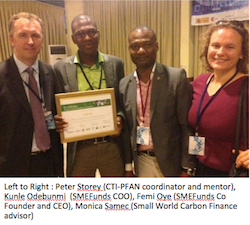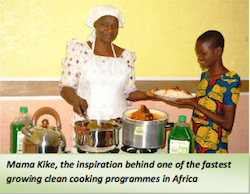West African entrepreneurs and companies presented 10 clean energy projects totaling over USD $8 0 million to invest in Accra during the West Africa Forum for Clean Energy Financing (WAFCEF). The projects ranged from biofuels to solar, to biomass and hydropower. More than 100 financiers, clean energy experts and representatives of financial institutions from Africa and around the world took place in the event.
0 million to invest in Accra during the West Africa Forum for Clean Energy Financing (WAFCEF). The projects ranged from biofuels to solar, to biomass and hydropower. More than 100 financiers, clean energy experts and representatives of financial institutions from Africa and around the world took place in the event.
WAFCEF was the final stage of a business plan competition launched in March 2013 by the Climate Technology Initiative Private Financing Advisory Network (CTI-PFAN) and the Ecowas Center for Renewable Energy and Energy Efficiency (ECREEE), in partnership with the Sustainable Energy Fund for Africa (SEFA) and other regional partners.
According to Joao Duarte Cunha, Coordinator of SEFA, “This initiative united like-minded partners interested in harnessing the entrepreneurial talent of the region to promote economic progress by using West Africa’s vast clean energy resources. WAFCEF really connected all the dots – entrepreneurs, ideas, advisory support and financing – and provided a platform for the often neglected smaller clean energy projects to succeed.”
The contest entailed the presentations of 10 qualified project sponsors who presented their business plans to potential investors and made a pitch for financing. The goal was to identify the most promising business ideas and unlock renewable energy and energy efficiency investment in West Africa. The 10 projects had been selected from over 70 submissions from across the ECOWAS region for their economic viability and environmental benefits. Before being presented at the Forum, each of them had received intensive mentoring from professional consultants.
SME Funds‘ Bioethanol Scale-Up Project from Nigeria was picked as the winner of the WAFCEF 2013 business plan competition. The $28 million Investment in the first round will go towards scaling up their renewable ethanol cooking gel production and clean cookstove manufacturing. Already over 1 million liters of cooking gel has been produced locally using 2G Cellulosic Bio-Ethanol technology from wastes such as water hyacinth and sawdust from Lagos saw mills. SMEFunds has already recruited over 15,000  entrepreneurs through its Carbon Credit Network and helped them start green businesses that sell the cooking gel and stoves across Nigeria and West Africa.
entrepreneurs through its Carbon Credit Network and helped them start green businesses that sell the cooking gel and stoves across Nigeria and West Africa.
“People are hungry for good alternatives to kerosene and other unsafe, dirty cooking fuels,” said SMEFunds Co-founder and CEO Femi Oye. “We started with the simple belief that cooking shouldn’t kill. Why should our women cook with tears?”
SMEFunds plans to reach over 10 million households across West Africa with clean cooking and renewable energy technologies.

